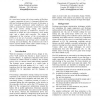Free Online Productivity Tools
i2Speak
i2Symbol
i2OCR
iTex2Img
iWeb2Print
iWeb2Shot
i2Type
iPdf2Split
iPdf2Merge
i2Bopomofo
i2Arabic
i2Style
i2Image
i2PDF
iLatex2Rtf
Sci2ools
126
click to vote
ITC
2003
IEEE
2003
IEEE
Double-Tree Scan: A Novel Low-Power Scan-Path Architecture
In a scan-based system with a large number of flip-flops, a major component of power is consumed during scanshift and clocking operation in test mode. In this paper, a novel scan-path architecture called double-tree scan (DTS) is proposed that drastically reduces the scan-shift and clock activity during testing. The inherent combinatorial properties of double-tree structure are employed to design the scan architecture, clock gating logic, and a simple shift controller. The design is independent of the structure of the circuit-under-test (CUT) or its test set. It provides a significant reduction both in instantaneous and average power needed for clocking and scan-shifting. The architecture fits well to built-in self-test (BIST) scheme under random testing, as well as to deterministic test environment. .
| Added | 04 Jul 2010 |
| Updated | 04 Jul 2010 |
| Type | Conference |
| Year | 2003 |
| Where | ITC |
| Authors | Bhargab B. Bhattacharya, Sharad C. Seth, Sheng Zhang |
Comments (0)

